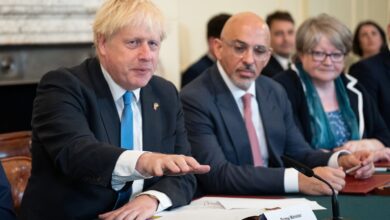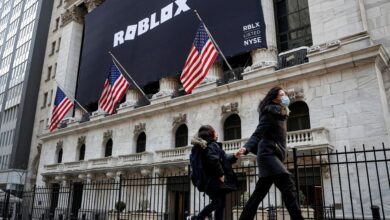UK economy grew 0.2% in August, propped up by services sector

One Canada Square, at the heart of Canary Wharf financial district seen standing between the Citibank building and HSBC building on 14th October 2022 in London, United Kingdom.
Mike Kemp | In Pictures | Getty Images
U.K. gross domestic product grew by 0.2% in August, the Office for National Statistics estimated Thursday, partially recovering from a downwardly revised 0.6% contraction in July.
Services output was the main contributor to growth in August, adding 0.4% on the month to offset a fall in production output of 0.7% and a decline in construction output by 0.5%.
“While this data point is not yet consistent with a build-up of slack in the U.K. economy, it must be looked in the totality of the data, which shows early signs of a cooldown in the labour market and thus, lower inflation down the road,” said Mathieu Savary, chief European strategist at BCA Research.
“It does not change the outlook for the Bank of England and confirms that the Bank Rate does not have much upside from here, but will remain at current levels for an extended period.”
The Bank of England last month ended a run of 14 consecutive interest rate hikes after data showed inflation was running below expectations. Between December 2021 and August 2023, the Bank lifted its main policy rate from 0.1% to a 15-year high of 5.25%.
“The UK has grown faster than France and Germany since the pandemic and today’s data shows the economy is more resilient than expected,” U.K. Finance Minister Jeremy Hunt said Thursday.
“While this is a good sign, we still need to tackle inflation so we can unlock sustainable growth.”
U.K. headline inflation dipped to an annual 6.7% in August, below expectations but still well above the Bank’s 2% target.
Suren Thiru, economics director at the Institute of Chartered Accountants in England and Wales (ICAEW), said the underwhelming rebound from July’s contraction provides “further evidence that higher borrowing costs are hurting the economy” and makes another interest rate rise at the Bank of England’s November meeting less likely.
“This disappointingly weak return to growth points to an economy fraying at the edges as inflation and higher interest rates hinder businesses and consumers,” Thiru said, adding that August’s GDP increase largely reflected the reversal of the squeeze on July’s services activity from poor weather and strikes.
“With inflation, higher taxes and the lagged impact of previous interest rate rises weighing heavily on consumer demand and business activity, the UK is likely to remain uncomfortably close to recession well into next year,” he added.




